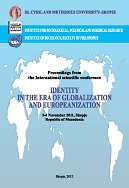
THE FUTURE OF THE NATION-STATE IN THE ERA OF GLOBALIZATION
The structure of the system of nation-states, established with the Peace of Westphalia in 1648, as a new political order in Europe which rests upon sovereign and independent states, constantly evolves and changes. Today’s trend of globalization, as a complex process that involves not only a commercial process which includes exchange of goods, capital and services across national borders, but also an increased number of interconnections in politics and culture, has a serious influence on the traditional concept of the world order and the international relations, according to which the basic unit that determines the way we act globally is the nation-state. Namely, globalization, as a concept, contradicts the traditional understanding of the primacy of the nation-state in the world order and introduces a possibility for parallel existence of various non-state subjects, which would have equal or even superior role to the nation-state. Moreover, globalization seriously affects the classical concept of sovereignty that explains the nature of the nation-state and represents one of the basic conditions for its existence. This paper has placed its focus on the future of the nation-state in the era of globalization. The question whether it is going to succeed to survive under the pressure of globalization, or what would its eventual further transformation and adaptation look like, as a response to the challenges of globalization, is the theme which is equally important for everybody, as a member of one of the almost 200 nation-states which exist in the world today.
More...
